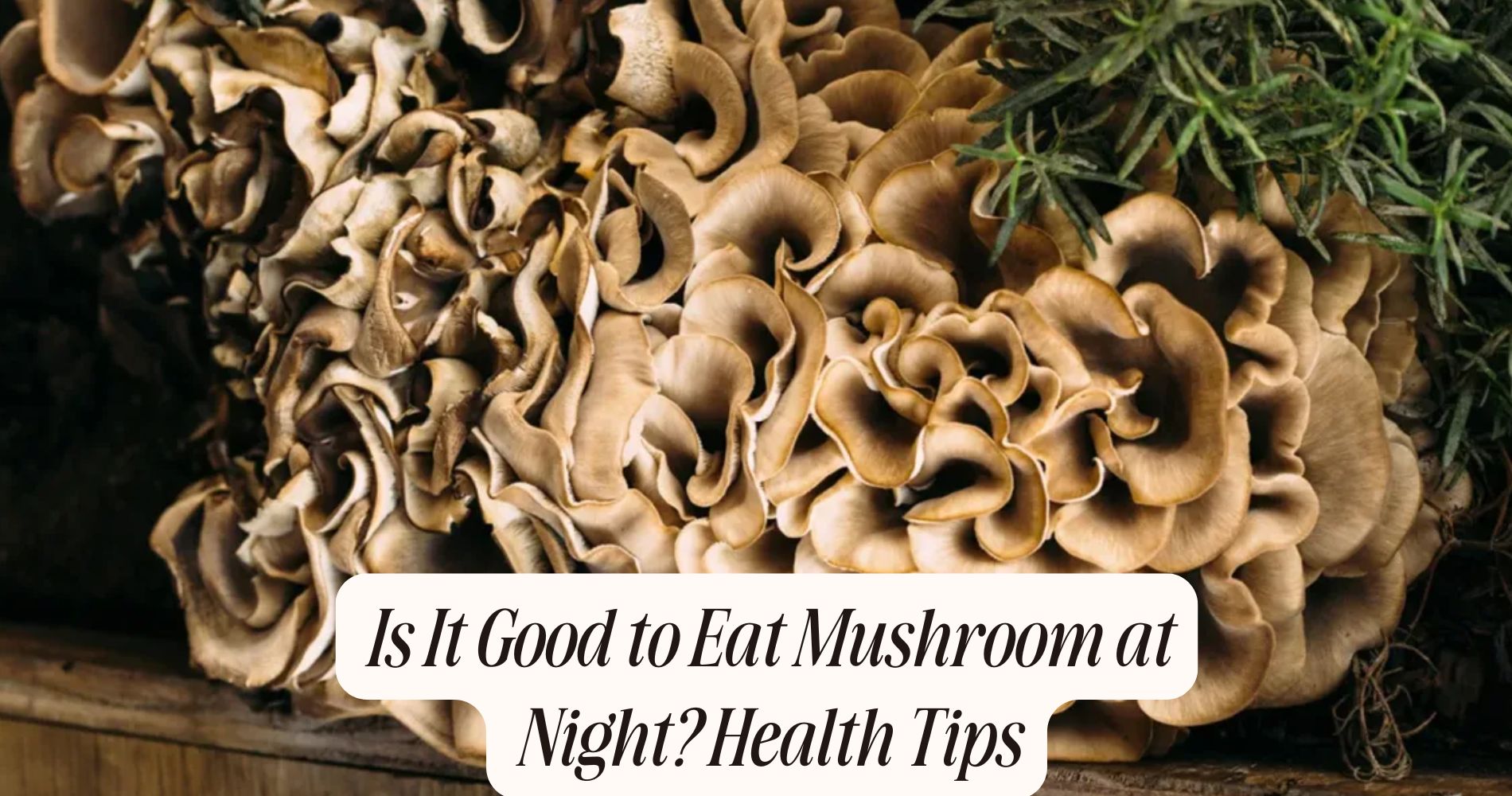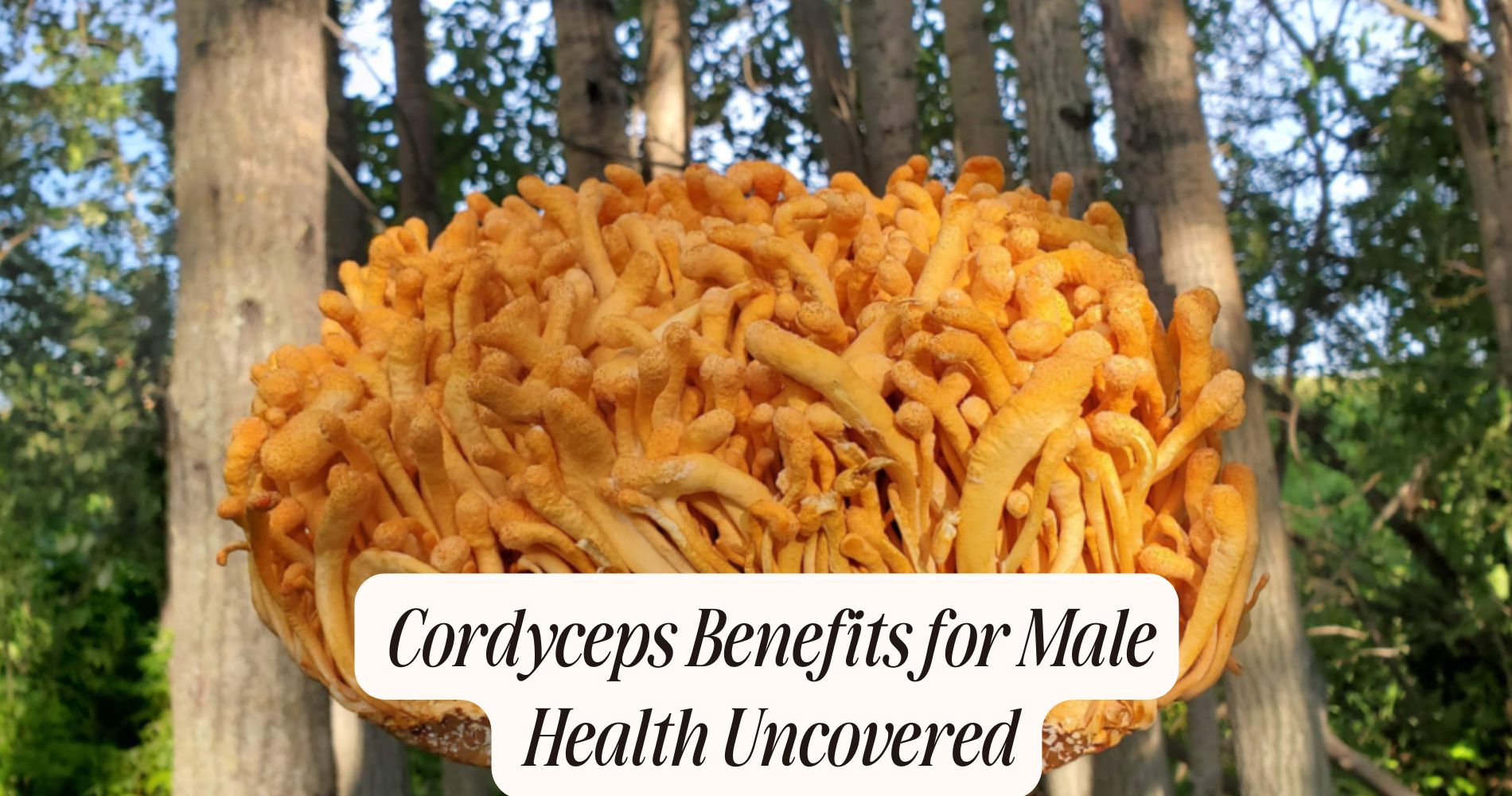
Is It Good to Eat Mushroom at Night? Health Tips
Is it good to eat mushroom at night? Eating mushrooms at night can be a healthy option if you do it mindfully. They're low in calories, rich in fiber, and provide essential nutrients that support digestion and may enhance sleep quality. However, moderation is key; too many may lead to discomfort, especially if consumed raw. Certain varieties like reishi and lion's mane can promote relaxation, while the fiber content aids gut health. Pairing mushrooms with lighter meals can optimize their benefits. If you're curious about which types are best for evening meals or how to prepare them, there's more to explore!
Nutritional Benefits of Mushrooms
Mushrooms are packed with essential nutrients that can greatly enhance your diet. These versatile fungi come in various mushroom varieties, each offering unique health benefits. For instance, shiitake mushrooms are known for their ability to support heart health, while portobello mushrooms are rich in antioxidants. By incorporating different types into your meals, you can diversify your nutrient intake.

Mushrooms are low in calories but high in vitamins, minerals, and fiber. They contain B vitamins, which help with energy metabolism, and essential minerals like selenium, vital for immune function. Additionally, mushrooms are one of the few non-animal sources of vitamin D, especially if exposed to sunlight during growth.
Their culinary uses are extensive, ranging from soups and salads to stir-fries and pastas. You can sauté, grill, or roast mushrooms to enhance their flavors, making them a fantastic addition to various dishes.
Impact on Digestion
When you eat mushrooms at night, their unique nutrient composition can influence your digestion.
They contain compounds that interact with digestive enzymes, potentially aiding in the breakdown of food.
Additionally, the timing of your meal can affect your metabolism, which is worth considering if you're eating mushrooms late.
Nutrient Composition Analysis
Eating mushrooms at night can influence your digestion due to their unique nutrient composition. Various mushroom varieties, like shiitake, portobello, and button mushrooms, offer different benefits. They're low in calories and rich in dietary fiber, which can promote a healthy digestive system. Fiber aids in bowel regularity, helping prevent constipation and enhancing gut health.
When you consider cooking methods, sautéing or steaming mushrooms can retain more nutrients compared to frying. These methods help preserve their fiber content, while also allowing you to enjoy the full range of vitamins and minerals, including B vitamins, selenium, and potassium. B vitamins are vital for energy metabolism, while selenium acts as an antioxidant, supporting overall health.
However, it's important to keep portion sizes in mind. Overeating mushrooms at night might lead to discomfort for some people due to their high fiber content.
It's also worth noting that certain mushroom varieties can be harder to digest when raw. If you're sensitive to digestive issues, choosing cooked mushrooms can be a gentler option.
Digestive Enzyme Interaction
Often underestimated, the interaction between mushrooms and digestive enzymes can significantly impact how your body breaks down and absorbs their nutrients. Different mushroom varieties, such as shiitake, portobello, and oyster mushrooms, contain unique polysaccharides and proteins that require specific enzymes for effective digestion. The enzyme activity in your digestive system plays a vital role in breaking down these compounds, allowing your body to access essential vitamins and minerals.
When you consume mushrooms, your body activates enzymes like amylase and protease to facilitate digestion. However, some individuals may experience difficulty digesting certain mushroom varieties, particularly those with tough cell walls. This can lead to bloating or discomfort, especially if consumed in large quantities at night.
Incorporating mushrooms into your diet in moderation can enhance enzyme activity and promote better digestion. Cooking mushrooms also helps break down their cell walls, making nutrients more accessible.

Additionally, pairing mushrooms with foods rich in digestive enzymes, such as pineapple or papaya, can optimize nutrient absorption. Overall, understanding the relationship between mushrooms and digestive enzymes can help you enjoy their benefits while minimizing any digestive discomfort.
Timing and Metabolism Effects
Timing plays an essential role in how your body metabolizes food, including mushrooms. Eating mushrooms at night can influence your digestion and overall metabolism. Mushrooms are low in calories and packed with nutrients, making them a healthy choice. However, consuming them late in the evening can trigger night cravings, which might lead to overeating or unhealthy snacking.
Your body's metabolism operates on a circadian rhythm, meaning it processes certain foods more effectively at specific times. While mushrooms are rich in fiber, which aids digestion, your digestive system may slow down at night, making it harder for your body to break down food efficiently. This could lead to discomfort or disrupted sleep if eaten too close to bedtime.
If you crave mushrooms at night, consider moderating your portion size or pairing them with lighter meals. This way, you can enjoy their benefits without overwhelming your digestive system.
Ultimately, it's about finding a balance that works for you and your body's rhythm. Keep in mind that everyone's metabolism is different, so pay attention to how your body responds to nighttime mushroom consumption.
Effects on Sleep Quality
Eating mushrooms at night can impact your sleep quality in several ways.
Their nutrient content, including compounds that may promote relaxation, could help you wind down.
However, consider how their digestive effects might influence your comfort and rest, as a heavy meal close to bedtime can disrupt sleep.
Nutrient Content Influence
The nutrient content of mushrooms can greatly impact your sleep quality, making them a valuable addition to your evening meals. Different mushroom varieties, such as shiitake, reishi, and portobello, offer unique nutrient profiles, which can influence your overall health and sleep patterns.
For instance, reishi mushrooms are known for their calming properties, while shiitake provides essential vitamins and minerals that can enhance your body's ability to absorb nutrients.
When you consume mushrooms at night, you're not just adding flavor to your dish; you're also promoting better nutrient absorption overall. The B vitamins found in mushrooms, particularly B6 and folate, play a significant role in the production of neurotransmitters like serotonin and melatonin, both of which are essential for regulating sleep.

Additionally, the presence of minerals such as magnesium can help relax your muscles and improve sleep quality.
Incorporating a variety of mushrooms into your dinner can help support restful sleep. Just remember to balance your meals with other nutrient-dense foods to maximize the benefits and guarantee your body is well-prepared for a good night's rest.
Digestive Impact at Night
Many people may not realize that the digestive impact of mushrooms can greatly affect sleep quality, especially when consumed at night. While mushrooms are low in calories and rich in nutrients, they also contain fiber and complex carbohydrates, which can influence your gut health. Eating mushrooms close to bedtime might lead to increased nighttime cravings as your body works to digest them, potentially disrupting your sleep.
For some, the fiber content in mushrooms can cause bloating or discomfort, making it harder to fall asleep. If you have a sensitive stomach, consuming mushrooms at night may not be the best choice. Your digestive system is generally less active while you sleep, and heavy or fibrous foods can lead to discomfort, ultimately affecting your rest.
On the flip side, mushrooms can be a healthy addition to your diet if consumed earlier in the evening. Their nutrients can promote overall gut health, which is essential for a good night's sleep.
Sleep-Inducing Properties
Mushrooms possess unique properties that may contribute to better sleep quality. Certain mushroom varieties, like reishi and lion's mane, have been linked to promoting relaxation and reducing anxiety, which can enhance your sleep cycles.
Reishi mushrooms, in particular, contain compounds known as triterpenes that may help lower blood pressure and induce calmness, making it easier for you to wind down at night.

Lion's mane mushrooms are also significant; they contain bioactive compounds that can support brain health and may improve cognitive function. By reducing mental clutter, they might lead to more restful sleep.
Moreover, these mushrooms are rich in polysaccharides, which can boost your immune system, potentially decreasing the likelihood of sleep disturbances caused by illness.
However, while these benefits are promising, it's important to remember that individual responses to mushrooms can vary. Consuming mushrooms too close to bedtime mightn't work for everyone, so you should pay attention to how your body reacts.
Incorporating specific mushroom varieties into your evening meals could be a simple step towards enhancing your overall sleep quality, but moderation and timing are key factors to reflect on.
Common Myths Debunked
When it comes to eating mushrooms at night, several myths can cloud your judgment. One common misconception is that mushrooms are heavy and hard to digest, making them unsuitable for nighttime nutrition. In reality, mushrooms are low in calories and high in fiber, which can aid digestion rather than hinder it.
Another myth suggests that consuming mushrooms before bed can lead to vivid dreams or nightmares. While some foods can influence sleep quality, mushrooms don't have any scientifically proven effect on dream patterns.
You might also have heard that mushrooms contain toxins that can disrupt your sleep. Most edible mushrooms are safe and packed with nutrients like B vitamins, which actually support overall health and well-being.
Lastly, there's the belief that mushrooms should be avoided at night due to their potential to cause allergies or sensitivities. While it's true that some individuals may have specific sensitivities, this isn't a universal issue.
Tips for Eating Mushrooms at Night
If you're considering adding mushrooms to your evening meals, there are a few tips to keep in mind for an enjoyable experience.
First, opt for lighter mushroom recipes, like stir-fries or soups, which won't weigh you down before bedtime. Cooking methods like sautéing or grilling can enhance the natural flavors of mushrooms while keeping them healthy.
Next, consider the variety of mushrooms you're using; some, like shiitake or cremini, can add depth to your dishes without being too heavy. If you're looking for a quick meal, try pairing mushrooms with whole grains or leafy greens for a nutrient-packed option.
Remember to wash and clean your mushrooms properly before cooking to remove any dirt or contaminants.
Also, avoid adding too much salt or heavy cream, as these can disrupt digestion and potentially affect your sleep quality.
Lastly, listen to your body. If you notice any discomfort after eating mushrooms at night, it might be best to adjust your portion sizes or cooking methods.
With these tips, you can enjoy mushrooms as a delicious and healthy addition to your nighttime meals.
Best Mushroom Varieties for Evening Meals
Choosing the right mushroom variety for your evening meals can elevate both flavor and nutritional value. When considering mushroom varieties, you'll find that each type brings unique benefits and tastes to your evening recipes.
Shiitake mushrooms are a fantastic choice, known for their rich, savory flavor. They're also packed with antioxidants, which can support your immune system.
Another great option is cremini mushrooms; these have a slightly stronger taste than white button mushrooms and are versatile in various dishes, from stir-fries to pasta.

If you're looking for something with a unique flavor, consider using oyster mushrooms. They've a delicate texture and are rich in vitamins, making them excellent for lighter evening meals.
Finally, portobello mushrooms are perfect for hearty dishes; they can even serve as a meat substitute due to their substantial texture.
Incorporating these mushroom varieties into your evening recipes not only enhances the meal but also contributes beneficial nutrients.
Whether you're sautéing, grilling, or adding them to soups, mushrooms can transform your dinner into a delicious, health-conscious experience. Enjoy experimenting with these varieties to find your favorites!
Nighttime Wellness Made Simple with Well Gummies SUPER MUSHROOM GUMMIES
Wondering is it good to eat mushroom at night? If you’re looking for an easy and convenient way to enjoy the benefits of mushrooms, try Well Gummies SUPER MUSHROOM GUMMIES. With ten functional mushrooms, these vegan gummies are designed to support calmer energy, improved focus, and enhanced immune health—perfect for any time of day, including evenings.
Infused with a fresh wild berry flavor, they’re as delightful as candy but with no jitters or crashes. Add Well Gummies to your routine for a simple, tasty way to prioritize your health and well-being.
Frequently Asked Questions
Can Mushrooms Cause Allergic Reactions if Eaten at Night?
Mushroom allergies can trigger reactions regardless of when you eat them. Nighttime digestion might slow your body's response, but if you're allergic, it's essential to avoid mushrooms altogether, regardless of the time. Stay safe!
How Do Mushrooms Affect Mood and Mental Health?
Mushroom compounds can positively affect your mood and mental health. Certain varieties enhance mood by boosting serotonin levels, promoting emotional well-being. So, incorporating mushrooms into your diet might provide a natural mood enhancement benefit.
Are There Any Interactions With Medications When Consuming Mushrooms?
When consuming mushrooms, you should be aware that certain mushroom types can interact with medications, potentially altering their effects. Always consult your healthcare provider to guarantee safety and avoid any adverse medication effects.
Can Mushroom Consumption Lead to Weight Gain at Night?
Mushroom consumption doesn't inherently lead to weight gain at night. Your body's metabolism processes mushrooms effectively. However, nighttime digestion can vary among individuals, so monitor how they affect your overall caloric intake and satisfaction.
Are There Specific Mushrooms to Avoid When Eating Late?
When eating late, you should be cautious with certain mushrooms like shiitake or portobello, as they might cause digestion concerns. Opting for lighter varieties can help you enjoy health benefits without discomfort during the night.
Conclusion
Eating mushrooms at night can be beneficial, thanks to their rich nutritional profile and potential digestive advantages. They may even support better sleep quality for some people. However, it's crucial to reflect on your individual digestion and any myths surrounding mushrooms. By choosing the right varieties and preparing them mindfully, you can enjoy their health benefits without worry. So, if you love mushrooms, don't hesitate to add them to your evening meals for a nutritious boost!




